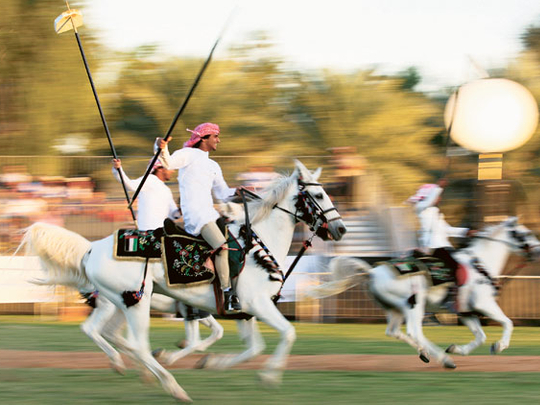
Al Ain: Nations of the world must safeguard their cultural heritage and traditions and let them play a role in the development of societies, both intellectually and economically, the participants in the international falconry conference were told here yesterday.
Modernisation has strongly influenced natural and cultural environments and needs immediate attention in the 21st century. The recognition of falconry as a living human heritage by Unesco offers an opportunity to encourage cultural dialogue and preserve heritage, said Mohammad Ahmad Al Bawardi, a member of the Abu Dhabi Executive Council.
"As we keep up with such modernisation, we must safeguard our deep-rooted traditions and preserve our rich cultural heritage which we share with other countries," said Al Bawardi at the opening session of the International Falconry Conference yesterday.
The session was also attended by Majid Al Mansouri, Chairman of Public Municipal Affairs, Mohammad Khalaf Al Mazroui, Director General of Abu Dhabi Authority for Culture and Heritage, Katleen Bogabie, Hungarian Ambassador and Roger Abtoun, the president of the Falconers British Club and a writer who was invited to the First International Festival of Falconry in 1976, and a number of delegates.
Al Bawardi said falconry has received the most important international recognition.
"Not only does this beautiful hobby mean the practice of hunting, but also represents a set of inherited traditions and social values and rich cultural heritage, which dates back thousands of years. This hobby has been shared by nations, groups and individuals and is their pride," he said.
Unique model
The efforts to register falconry in Unesco, he said, were sponsored by the (Adach) and represents a unique model of co-existence and civil and cultural integration among the peoples of the world. The UAE began its interest in preserving falconry as a human heritage since the beginning of its inception and particularly since 1976. "Falconry represents our values, traditions and national identity," he added.
The UAE was a pioneer in falcon breeding and preservation programmes, he said, and encouraging falconers for a long time to deal with falcons bred in captivity in order to give the wild falcons the opportunity to breed and increase their numbers in the wild.
The National Avian Research Centre (NARC) in Sweihan has also been playing a lead role in the preservation of the houbara, the main prey used in falconry in the UAE, he said. Production may reach 4,500 Asian houbaras next year after it reached 2,726 this year. The Centre plans to release 1,700 Asian houbaras in 2012, which will contribute to the restoration of sustainable numbers of migratory and settling houbara in the coming years, he said.
"Shaikh Zayed Bin Sultan Al Nahyan's efforts throughout 30 years to protect this endangered bird, after he realised the importance of establishing a specialised programme for breeding bustards and protecting them from extinction."
He said President His Highness Shaikh Khalifa Bin Zayed Al Nahyan was behind an international initiative to launch 50,000 a year of Asian and North African houbaras.
Al Bawardi said that the UAE has played a leading role in fighting illicit trading in falcons and bustards.
Grants for 450 projects
The Mohammad Bin Zayed Species Conservation Fund has given grants for 450 environmental projects carried out in 100 countries since its inception in 2008.
The Fund has received a donation of ¤25 million from Shaikh Mohammad Bin Zayed Al Nahyan, Abu Dhabi Crown Prince and Deputy Supreme Commander of the UAE, to support global efforts to protect the diversity of wildlife and the preservation of endangered species.








